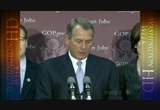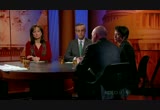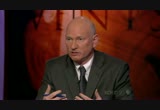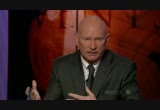tv Washington Week PBS December 8, 2012 2:00am-2:30am PST
2:00 am
gwen: who will be blamed if negotiations break down? the surrogates are talking tough. >> theres nothing going on privately that's not going on publicly. >> is the administration prepared to go over the fiscal cliff? >> oh, absolutely. gwen: behind the scenes -- tea party pressure, as the movements most prominent senator builds a new platform. >> a lot of my role in the senate has been stopping bad things and saying no to bad things, but we need to do more than that gwen: abroad, tensions in syria on the rise. can the u.s. intervene? should we? covering the week -- jackie calmes of "new york times," eamon javers of cnbc, amy walter of abc news, and james kitfield of "national journal." >> award-winning reporting and analysis covering history as it happens. live from our nations capitol, this is washington week with
2:01 am
gwen ifill, produced in association with national journal. corporate funding for washington week is provided by -- ♪ >> wherever our trains go, the economy comes to life. norfolk southern. one line, infinite possibilities. >> we know why we're here. to charlotte a greater path, in the air and in our factories. >> to find cleaner, more efficient ways to power flight. >> and harness our technology for new energy solutions. >> around the globe, the people of boeing are working together
2:02 am
to build a better tomorrow. >> that's why we're here. >> additional corporate funding is provided by prudential additional funding is also provided by the annenberg financial. foundation, the corporation for public broadcasting and by contributions to your pbs station from viewers like you. thank you. once again, live from washington, moderator gwen ifill. gwen: good evening. its hard to believe, but weve been here before. first, negotiators pledge to work together then they test what the other side is willing to give. then they submit plans they know the other side will reject. and then, only then, a deal is struck. maybe, but not yet. and with every day that passes, congress and the white house edge close to raising taxes,
2:03 am
cutting spending and sending the nation back into recession. here are the arguments -- >> the speaker's proposal right now is still out of balance. he talks about, for example, $800 billion worth of revenues but he says he will do that by lowering rates. when you look at the math, it does not work. >> this week we made a good-faith offer to avert the fiscal crisis and that offer included significant spending cuts and reforms and it included additional revenue and frankly, it was the balanced approach that the president's been asking for. now we need a response from the white house. we can't sit here and negotiate with ourselves. gwen: against that backdrop, new signs today that the economy is strengthening, with the jobless rate dropping to 7.7%, its lowest in four years. but even thats a mixed bag, isnt it, eamon? >> yeah, absolutely. this is a good but not great
2:04 am
jobs number. we created 146,000 jobs in this country in november but the unemployment rate goes down to 7.7% for the wrong reasons, because a lot of people left the labor force. you'd rather s more people coming into the labor force who have been sitting on the sidelines and say hey, i think now i can get a job. also, they're going back and adjusting the previous numbers that we thought were really blockbuster. a strong number that definitely gives the president some political momentum but not as strong as it appears. gwen: but political momentum is exactly what this administration is look for. does this help give them the momentum they need? >> the president is in this debate with the greater leverage by virtue of his re-election and the fact he campaigned the issue at the core of these negotiations, raising rates on
2:05 am
high income. this report i don't see as changing the dynamic much at all. it was one of these reports that both side could and did day care from it what they wanted to. even at 146,000, that's not at a level high enough to be bringing back into employment a lot of people that lost their jobs. gwen: there's a public dynamic, which we just say -- saw, the president and speaker. then we hope, we assume, they're a private dynamic going on. what do we know about that? >> if you talk to the speaker of the house and his statue they say there are negotiations going on between the speaker and the president. on thursday the staffs met and hashed some things out. i'm told they're going to continue talks through the weekend now, so there's something going on here behind the scenes. what we don't know but publicly
2:06 am
they continue to fire off artillery barrageses. part of it is they can't admit they have a deal until they have one nailed down. what's been fascinating is to watch how quickly the dow is reacting to every one of these speeches by these congressional leaders on capitol hill. up 50 points here, down 80 points. every indication that things are optimistic or pessimistic, the dow is roller coastering on this. that has been something i think washington has been watching and paying attention to, the real economic stakes. >> obviously they can't get a deal too early because the leverage gets better as you get closer to the cliff. but is there a time frame that's dangerous when you're getting too close? >> there are two weeks left before the christmas holiday. that's a really sort of time. that would mean they'd sort of
2:07 am
have to put a deal together next week so you could have the following week to sell it. at this point i don't see any real chance that we'll not be back after christmas and it would be right town january 1. the other thing is for all this attention, like in the clips you slowed of the issue being the top rates, whether the top rates for high income will go up to the clinton era rates again or as republicans would try to keep them as close as possible, if not at the currents bush era rates. even if they settle that issue, there are a lot of other issues out there. those top rates will raise -- even if president obama gets everything he asked for, about 400 billion. and he wants $1.6 trillion. that's one quarter of the revenues he's seeking. gwen: politically that seems to be the fight he wants to have. >> he wants to put the republicans in the box and blame
2:08 am
them for this. let them feel the political pain that comes with this. because his position on this polls very well. most people in this country say they want the president's solution. the trick is most people on capitol hill know that and can they find an artful way to get to a deal where they don't feel too badley humiliated. they're going to lose on the politics eventually i think everyone thinks. can they do it and will the president let them grace fully? -- gracefully? >> we haven't heard a lot of sniping or leaking but when do they start getting antsy? >> he's never had more power or influence than he has right now over them. they had a rough two years and one of the worst reputations of any congress in history for its lack of achievement and he, through that past two years of back and forth throughout 2011,
2:09 am
they were on a high learning curve but they learned that, you know, you do need revenue and the only way you're going to get revenues or get to the deficit number they want is to have both revenues and spending cuts. the only way to get the spending cuts and entitlements from the president they want is to give him some political revenues. >> when john boehner made his offer there were signatures of all the republican leaders on that letter, including cantor and paul ryan, viewed as a future presidential candidate among republicans. so by locking down those signatures on that $00 billion of new taxes, he's blocked those guys from opposing him. very savvy. >> did anybody phone some of the quemplets offer the budget
2:10 am
committees? >> he did in order to demonstrate his power. gain bah boehner has been here a long time. he saw the coup attempt to speaker gingrich by members of his old party. he knows he has to hold those people together to negotiate with the president. he saw a little bit of wiggle room earlier with jim demint coming out earlier and said he thought the tax offer was an outrage. from the right you can see the speaker tamping that out with his boot. gwen: the president has not always been where he is on this now with the tax rate. he's said in the past that maybe the tax rates should not be raised and that would be bad for the economy. what changed? >> the economy changed. the economy is better. a lot has been made of the fact that the president caved two years ago, december of 2010. that was when the buschera tax
2:11 am
rates first expired and he agreed to a two-year extension. yes, he caved but i think in fairness to the president he got a lot for it and the economy wasn't doing so well, which is why he wanted stimulus in the first place. in return for extending them then, he got payroll tax cut for all workers, that is now expiring and other tax rates for small businesses and individuals. it was a pretty good package, more than he should have expected coming off december 2010 after a month after republicans had swept the election and taken back control of the house. there's history here but now the economy is good enough that he feels he can say this is it, i'm standing my ground, we're going to end these rates and yet he still wants some stimulus in his deal, infrastructure spending. gwen: this is an interesting moment where we're not hearing a
2:12 am
lot from either side. either they're keeping it to themselves because they're making progress or there's nothing to say. which is more likely? >> i think they're keeping it to themselves because they're making progress. there's something cooking behind the scenes. gwen: why do you think that? >> you saw last week when the president made his first offer to speaker boehner. boehner's office leaked that out almost immediately to the press and then mcconnell's office leaked out the fact that mccobble had laughed at tim geithner when geithner presented him with this offer. we're seeing very tightly coordinated statements between the white house and the speaker's office in terms of the wording and timing of the statements whether they describe their negotiations is an indication that they're cooperating for now. what on and whether it will last is another question. gwen: this has been a lot of fun
2:13 am
for us because there's no question that the democrats and republicans are playing a kind of game of high stakes fiscal chess or chicken. but within the republican party, recalibration is under way. listen to south carolina senator and tea party leader jim demint. >> one of the mistakes i think the republican party made the last two years is trying to make obama the issue without sharing with america bold reform ideas that get people inspired to get behind us. gwen: demints surprise solution? to get out of the senate and set up shop at the conservative heritage foundation. is this about just jim demint, or something larger, amy? >> we can probably see a little bit of both. you're right, jim demint is the de facto leader of the tea party, but the tea party really isn't a movie -- movement either. it's a leaderless sort of entity. he's been a thorn in the side for leadership and for the establishment republicans for
2:14 am
quite some time. whenever boehner is the control for what he see is has compromise or caving, he stands up. he's been involved in a lot of interparty fights. most successfully, marco rubio. he beat charlie crist in a primary and one of his biggest failures is christine o'donnell. he's not afraid to get into the mix and we -- he didn't want to be here much longer. he was going to be out in 2016 so he was ready to go. you're right, the question is what does he do with this new position? use it to positive agenda? tell america what we stand for or, as many republicans we all talk too are worried about is he's going to use that perch to punish republicans who don't tow the tea party agenda.
2:15 am
gwen: what is the tea party? we saw that with dick army and paid a lot of money basically to go away. we've seen a lot of shifts and moves. jim demint's departure from the south carolina senate seat races the question of who replaces him? >> right, and there's a tea party governor whom he elected and there's a lot of talk she should pick tim scott for that seat. also a tea party candidate and he's african-american. what a great opportunity. that i got criticized for not diversifying and anybody that wasn't white. now you have an indian female governor appointing an african-american governor. gwen: the first since reconstruction. >> right, in south carolina. that has to sort of blow your mind. the other piece of this is getting to the point about where
2:16 am
the tea party is the talk of rebranding, a positive agenda and all of this. and yet every single one of those republicans who's sitting at the table right now listening to boehner talking about what the deal is going to be. they are much more worried about a primary challenge than worried about what this is going to look like in terms of their overall brand to the rest of the country. so if jim demint decides to use this perch -- by the way, he's also making a million dollars in this new job. if he decides to punish thousand republicans who stray by compromising, the tea party still stays in -- >> he thought he could be nor effect outside the senate than inside senate. is there something going on in the senate that makes him a logical move? >> of that whole generation that
2:17 am
came in this 2010 , these were the outsiders, they were going to change washington. they didn't want to be here but they had to come to shake things up. most of them stayed around and what was interesting in how hard they fought to hold on to their seats for someone who was just going to come here and do their time and leave. these folks are getting comfortable in it. he's leaving a pretty impressive legacy behind. marco rubio. i don't know that he loved it all that much in the first place. this seems like a much better fit. >> republicans who are feeling pressured by the possible primary challenge. >> senator lindsay graham is one. how does this impact his prospects? >> lindsay graham has been a target for the right for some time. he's up in 2014. this is when that new senator
2:18 am
appointed by governor haley would be up as well. part of this initially was good news if you're lindsay graham because conservatives are going to focus on that senate seat instead of him. but if he chooses someone like tim scott, who everyone in the party likes, who'sed a adequately conservative, they're going to train their sites back on graham's seat. look, he's survived challenges before. he's very well-liked but again, it's a republican primary in a time when you're going to have so much energy. >> doesn't lindsay graham's behavior on the senate floor and his prominence in some of these issues, really taking on the administration suggest he's running scared and scared in his own primary? >> yes. every single republican up in 2014 if you'll note also voted against bob dole's bill. he wanted to see a disability
2:19 am
bill through the senate because they were worried it was going to upset the tea party's vote. gwen: interesting. this may have been the week where the u.s. decided it can no longer afford to sit on the sidelines when it comes to syria. the tipping point? chemical weapons. >> this is a red line for the united states. i'm not going to telegraph in any specifics what we would do in the event of credible evidence that the assad regime has resorted to using chemical weapons against their own people, but suffice it to say we are certainly planning to take action if that eventuality were to occur. gwen: but given the lessons of libya and egypt, what -- places where we intervened and felt we had, to what does
2:20 am
take action mean? >> to lower expectations about what we can achieve by intervention. the situation in syria was getting so much that the costs of inaction were becoming so high they outweighed the risk of doing nothing. clearly the administration has come to that point. the radicalization of the opposition is one big point. they worry if he loses control it might fall into the hands of an al qaeda-type group. they also worry that that group might be the strongest group post assad and that sweg ways into an afghanistan kind of nightmare. it's spilling over to all the neighbors, many of whom are close allies of ours, jordan, turkey. i felt the administration thought it had to take a lot more assertive action. >> what is the pressure of russia, on moscow to dole with this? they've been backing their ally
2:21 am
syria. where are they? >> secretary clinton met with the foreign minister of russia a couple of days ago. obviously russia has backed another loser, its propensity in these things. i think they even see this now. probably the best-case scenario is there's some sort of soft landing where assad is offered an exile deal, gets out of the picture. and then you start the retribution massacres and it could turn into something extremely ugly. the hope is russia will get on board and be constructive. the foreign minister said good things but we'll see what russia does. >> what does an intervention looks like? >> if chemical weapons are used, i think it looks a lot like the air strikes in libya. you have to destroy some of
2:22 am
those major stockpiles of chemical weapons. if they start to lose control and there are fores that hezbollah might get ahold of them, you might see some special forces on the ground. the idea of chemical weapons, especially for close allies like israel getting into the hands of hezbollah is really frightening to them and us. short of military action, we're going to recognize the opposition next week, hillary clinton is we are sending patriot missiles, batteries for turkey for the border there. there's a lot going on behind the scenes just short of intervening. there was talk about armying the rebels. they've -- arming the rebels. they've overrun so many bases apparently they have enough weapons now to sort of turn the timed. >> isn't this the same thing we had in libya?
2:23 am
you go in on the side of the rebels, but you don't know their own power structure. >> right, and we've held them in arm's way because we didn't feel comfortable. we didn't have enough confidence that those were the ones that would actually comb to the fore in doha we twisted arms to get a more umbrella inclusive group now recognized by all our all liss. there's a sense that they have -- they're moderate mostly. they are not islamic radicals and they also have tries to military councils throughout syria so they have some weight inside. the problem with the previous generation was mostly exiles who didn't have any skin in the game inside syria. gwen: and there's a huge refugee problem. >> huge. hundreds of thousands in turkey, and lebanon and they're
2:24 am
destabilized in all the places they're going because the ethnic fracture between the sunnis and kurds, they take with them. we've seen fighting between the shiah and sunni in lebanon. jordan is terrified. they have 1 0,000 refugees and not the infrastructure to take care of them. gwen: a story which seems to be getting worse. thank you, everyone. the conversation has to end on air, but well continue online, where well talk some more about another problem spot for the u.s. -- egypt. and while youre on line be sure to see what else our panelists are reporting on, including todays supreme court decision to hear a challenge to californias gay marriage law. you can find that in our essential reads section at pbs.org/washingtonweek. keep up with daily developments with me over at the pbs newshour, and well see you again next week on washington week. good night. and happy hanukkah, everybody.
2:25 am
>> funding for "washington week" is provided by -- >> this rock has never stood still. since 1875 we've been there for our clients through good times and bad. when their needs changed we were there to meet them. through the years from insurance to investment management from real estate to retirement solutions, we've developed new ideas for the financial challenges ahead. this rock has never stood still, and that's one thing that will never -- never change. prudential. corporate funding for washington >> week is provided by -- norfolk southern, boeing. additional funding for "washington week" is provided by the annenberg foundation, the
2:26 am
2:29 am
234 Views
IN COLLECTIONS
KQED (PBS) Television Archive
Television Archive  Television Archive News Search Service
Television Archive News Search Service 
Uploaded by TV Archive on

 Live Music Archive
Live Music Archive Librivox Free Audio
Librivox Free Audio Metropolitan Museum
Metropolitan Museum Cleveland Museum of Art
Cleveland Museum of Art Internet Arcade
Internet Arcade Console Living Room
Console Living Room Books to Borrow
Books to Borrow Open Library
Open Library TV News
TV News Understanding 9/11
Understanding 9/11




























